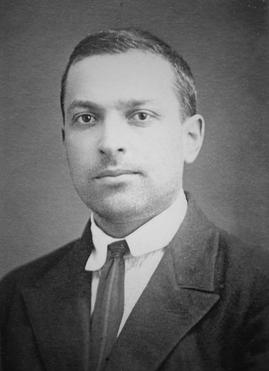
Mercedes Chaves Jaime (7 November 1956 La Uvita, Colombia - 22 August 2005 Tunja, Colombia) was a Colombian psycopedagogue, professor and educational researcher. Chaves established herself as a notable Vygotskian pedagogue in Latin America.

Mercedes Chaves Jaime (7 November 1956 La Uvita, Colombia - 22 August 2005 Tunja, Colombia) was a Colombian psycopedagogue, professor and educational researcher. Chaves established herself as a notable Vygotskian pedagogue in Latin America.
Her work extended to early childhood education and cognitive stages for child development in read/write processes. She was inspired by the work of the Soviet psychologist Lev Semyonovich Vygotsky, the founder of cultural-historical psychology.
Chaves was a proponent of the empty acts theory in children's learning processes. The theory argues that the relationship between teachers and students must be focused on the Vygotsky's Zone of Proximal Development, in order to avoid negative interactions with other students, potencializing the ability to interpret, as a complex interaction between the text and the reader, the information symbols represent, and to be able to re-create those same symbols so that others students can derive the same meaning.
Mercedes Chaves attended the National Pedagogic and Technological University of Colombia in Tunja, studying early childhood education and getting a degree in Bachelor of Education. In 1993 Chaves founded the Lev Vygotsky Research Center and Private School, located in Tunja. In 1993 she went on Bogotá to finish her studies in Education at the Pontifical Xavierian University, receiving a Master of Arts in Education with honors. From 1994 to 2004, Chaves was an academic in the field of child psychopedagogy, teaching at National Pedagogic and Technological University of Colombia.
Educational psychology is the branch of psychology concerned with the scientific study of human learning. The study of learning processes, from both cognitive and behavioral perspectives, allows researchers to understand individual differences in intelligence, cognitive development, affect, motivation, self-regulation, and self-concept, as well as their role in learning. The field of educational psychology relies heavily on quantitative methods, including testing and measurement, to enhance educational activities related to instructional design, classroom management, and assessment, which serve to facilitate learning processes in various educational settings across the lifespan.

Lev Semyonovich Vygotsky was a Russian and Soviet psychologist, best known for his work on psychological development in children and creating the framework known as cultural-historical activity theory. After his early death, his books and research were banned in the Soviet Union until Joseph Stalin's death in 1953, with a first collection of major texts published in 1956.
Instructional scaffolding is the support given to a student by an instructor throughout the learning process. This support is specifically tailored to each student; this instructional approach allows students to experience student-centered learning, which tends to facilitate more efficient learning than teacher-centered learning. This learning process promotes a deeper level of learning than many other common teaching strategies.
Student-centered learning, also known as learner-centered education, broadly encompasses methods of teaching that shift the focus of instruction from the teacher to the student. In original usage, student-centered learning aims to develop learner autonomy and independence by putting responsibility for the learning path in the hands of students by imparting to them skills, and the basis on how to learn a specific subject and schemata required to measure up to the specific performance requirement. Student-centered instruction focuses on skills and practices that enable lifelong learning and independent problem-solving. Student-centered learning theory and practice are based on the constructivist learning theory that emphasizes the learner's critical role in constructing meaning from new information and prior experience.

Early childhood education (ECE), also known as nursery education, is a branch of education theory that relates to the teaching of children from birth up to the age of eight. Traditionally, this is up to the equivalent of third grade. ECE is described as an important period in child development.
The psychology of learning refers to theories and research on how individuals learn. There are many theories of learning. Some take on a more behaviorist approach which focuses on inputs and reinforcements. Other approaches, such as neuroscience and social cognition, focus more on how the brain's organization and structure influence learning. Some psychological approaches, such as social constructivism, focus more on one's interaction with the environment and with others. Other theories, such as those related to motivation, like the growth mindset, focus more on individuals' perceptions of ability.

Constructivism in education is a theory that suggests that learners do not passively acquire knowledge through direct instruction. Instead, they construct their understanding through experiences and social interaction, integrating new information with their existing knowledge. This theory originates from Swiss developmental psychologist Jean Piaget's theory of cognitive development.
Cognitive apprenticeship is a theory that emphasizes the importance of the process in which a master of a skill teaches that skill to an apprentice.
Dynamic assessment is a kind of interactive assessment used in education and the helping professions. Dynamic assessment is a product of the research conducted by developmental psychologist Lev Vygotsky. It identifies

The zone of proximal development (ZPD) is a concept in educational psychology that represents the space between what a learner is capable of doing unsupported and what the learner cannot do even with support. It is the range where the learner is able to perform, but only with support from a teacher or a peer with more knowledge or expertise. This person is known as the "more knowledgable other." The concept was introduced, but not fully developed, by psychologist Lev Vygotsky (1896–1934) during the last three years of his life. Vygotsky argued that a child gets involved in a dialogue with the "more knowledgeable other" and gradually, through social interaction and sense-making, develops the ability to solve problems independently and do certain tasks without help. Following Vygotsky, some educators believe that the role of education is to give children experiences that are within their zones of proximal development, thereby encouraging and advancing their individual learning skills and strategies.
Anna Stetsenko is a developmental psychologist known for her important contributions to cultural-historical activity theory, building on the work of Lev Vygotsky, Leontiev and Alexander Luria. Her research centers human development, education, and social theory.
Social interactionist theory (SIT) is an explanation of language development emphasizing the role of social interaction between the developing child and linguistically knowledgeable adults. It is based largely on the socio-cultural theories of Soviet psychologist, Lev Vygotsky.
Learning through play is a term used in education and psychology to describe how a child can learn to make sense of the world around them. Through play children can develop social and cognitive skills, mature emotionally, and gain the self-confidence required to engage in new experiences and environments.

Neil Mercer is Emeritus Professor of Education at the University of Cambridge.
In the framework of the Cultural-Historical Activity Theory (CHAT) the leading activity is the activity, or cooperative human action, which plays the most essential role in child development during a given developmental period. Although many activities may play a role in a child's development at any given time, the leading activity is theorized to be the type of social interaction that is most beneficial in terms of producing major developmental accomplishments, and preparing the child for the next period of development. Through engaging in leading activities, a child develops a wide range of capabilities, including emotional connection with others, motivation to engage in more complex social activities, the creation of new cognitive abilities, and the restructuring of old ones.
Cultural-historical activity theory (CHAT) is a theoretical framework to conceptualize and analyse the relationship between cognition and activity. The theory was founded by L. S. Vygotsky and Aleksei N. Leontiev, who were part of the cultural-historical school of Russian psychology. The Soviet philosopher of psychology, S.L. Rubinshtein, developed his own variant of activity as a philosophical and psychological theory, independent from Vygotsky's work. Political restrictions in Stalinist Russia had suppressed the cultural-historical psychology – also known as the Vygotsky School – in the mid-thirties. This meant that the core "activity" concept remained confined to the field of psychology. Vygotsky's insight into the dynamics of consciousness was that it is essentially subjective and shaped by the history of each individual's social and cultural experiences. Since the 1990s, CHAT has attracted a growing interest among academics worldwide. Elsewhere CHAT has been described as "a cross-disciplinary framework for studying how humans transform natural and social reality, including themselves, as an ongoing culturally and historically situated, materially and socially mediated process". CHAT explicitly incorporates the mediation of activities by society, which means that it can be used to link concerns normally independently examined by sociologists of education and (social) psychologists. Core ideas are: 1) humans act collectively, learn by doing, and communicate in and via actions; 2) humans make, employ, and adapt tools to learn and communicate; and 3) community is central to the process of making and interpreting meaning – and thus to all forms of learning, communicating, and acting.
Leonid Vladimirovich Zankov — was a Soviet psychologist and defectologist, a member of Vygotsky Circle and a major administrator of scientific research in the Soviet Union.
In learning, co-construction is a distinctive approach where the emphasis is on collaborative or partnership working. The approach includes some more interactional processes such as cooperation and coordination.
Coaching psychology is a field of applied psychology that applies psychological theories and concepts to the practice of coaching. Its aim is to increase performance, self-actualization, achievement and well-being in individuals, teams and organisations by utilising evidence-based methods grounded in scientific research. Coaching psychology is influenced by theories in various psychological fields, such as humanistic psychology, positive psychology, learning theory and social psychology.
Carol Diane Lee is an American professor, educational researcher, school director and author. Now retired, Lee was the Edwina S. Tarry Professor of Education and Social Policy, Professor of Learning Sciences, and Professor of African-American Studies at Northwestern University. Her scholarly interests focus on the influences of culture and literacy on education, particularly among students in the African-American community. She chairs the Board of Director of the Betty Shabbazz International Charter School, an institution she helped found.